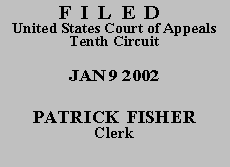

| DAVID LEROY,
Plaintiff-Appellant, v. PAMAX DEVELOPMENT, INC., a corporation, d/b/a Burger King, Defendant-Appellee. |
|
Plaintiff David Leroy was fired from his job as a manager with defendant Burger King. He filed suit, alleging that Burger King discriminated against him on account of a disability caused by knee problems, in violation of the Americans with Disabilities Act (ADA), 42 U.S.C. §§ 12101-12213, and the Oklahoma Anti-Discrimination Act, Okla. Stat. tit. 25, § 1101-1901. By consent of the parties, the magistrate judge issued a dispositive decision. See 28 U.S.C. § 636(c). After review, the magistrate judge granted summary judgment to Burger King. Mr. Leroy appeals. We have jurisdiction under 28 U.S.C. § 1291.
Our review is hampered by the deficiencies of appellant's brief on appeal. First, instead of presenting his arguments in his brief on appeal, appellant incorporated his district court brief by reference. This court has expressly disapproved that practice because Fed. R. App. P. 28 requires the appellant to set out an argument supported by authorities in his appellate brief. Gaines-Tabb v. ICI Explosives, USA, Inc., 160 F.3d 613, 623-24 (10th Cir. 1998) (discussing what is now Fed. R. App. P. 28(a)(9)). For this court to allow an appellant to incorporate a brief or other materials by reference would unnecessarily increase the court's work while allowing the appellant to skirt the page, word, or line limits that apply to his brief. Id. at 624. In this case, appellant's brief on appeal would exceed the thirty-page limit by about twenty pages if his district court brief were added to it.(1) See Fed. R. App. P. 32(a)(7). Because appellant incorporated his district court brief by reference, he failed to provide in his brief on appeal any citations to the record to point the court to the evidence that supports his position.
This court has concluded that arguments not fully set forth in the brief are waived. Gaines-Tabb, 160 F.3d at 624. Thus, we are not obligated to review appellant's arguments in this case. Nevertheless, we have reviewed de novo the magistrate judge's order in light of appellant's district court brief and the record on appeal.
Summarizing appellant's two lists of issues, he argues on appeal that: (1) he furnished enough evidence to establish genuine issues of material fact on his substantial impairment of a major life activity; (2) the district court cannot support regular attendance as an essential job function for appellant because appellee never offered any evidence to prove regular attendance was an essential job function; (3) the district court erred in not requiring appellee to engage in the interactive reasonable accommodation process and in acting as a super personnel department in its approval of appellant's firing; (4) the district court should be reversed for the same reasons on his Oklahoma state law handicap discrimination claim; and (5) any award of costs should be reversed.
The magistrate judge reviewed the facts alleged in appellant's deposition in light of the appropriate legal standard for the ADA. The magistrate judge stated that while appellant was working at Burger King/Bartlesville, he jogged, golfed, lifted weights, and walked for exercise, as if those were routine activities. The deposition does not support so broad a finding, as appellant testified that those activities were limited. However, the record does support the statements that appellant mowed his yard, raked leaves, occasionally took out the trash and vacuumed, and did other duties around his house while he was working at Burger King/Bartlesville. Appellant's App. at 95-96 (Appellant's depo. at 65-66). The magistrate judge could have added that appellant admitted that the duties he performed at his house required lifting, bending, and stooping, like his job. Id. at 94, 96 (Appellant's depo. at 60, 66). Therefore, the conclusion that appellant did not show that he is substantially limited in a major life activity by his knee problems is supported by the record. Appellant's district court brief does not raise an issue of material fact. His claim that regular attendance at work was not required is belied by his testimony that he was working seventy to eighty hours per week because the store had been neglected and his presence was required to clean it up and get it running at company standards. Id. at 94, 97, 101 (Appellant's depo. at 60, 71, 89). Appellant's other arguments are also without merit and do not warrant discussion.
Accordingly, we AFFIRM for substantially the same reasons as those set forth in the magistrate judge's May 2, 2001 order.
Entered for the Court
Circuit Judge
*. This order and judgment is not binding precedent, except under the doctrines of law of the case, res judicata, and collateral estoppel. The court generally disfavors the citation of orders and judgments; nevertheless, an order and judgment may be cited under the terms and conditions of 10th Cir. R. 36.3.
1. Because no certificate of compliance with word or line limits was included with appellant's brief, as required by Fed. R. App. P. 32(a)(7)(C), we deem the thirty page limit applicable.